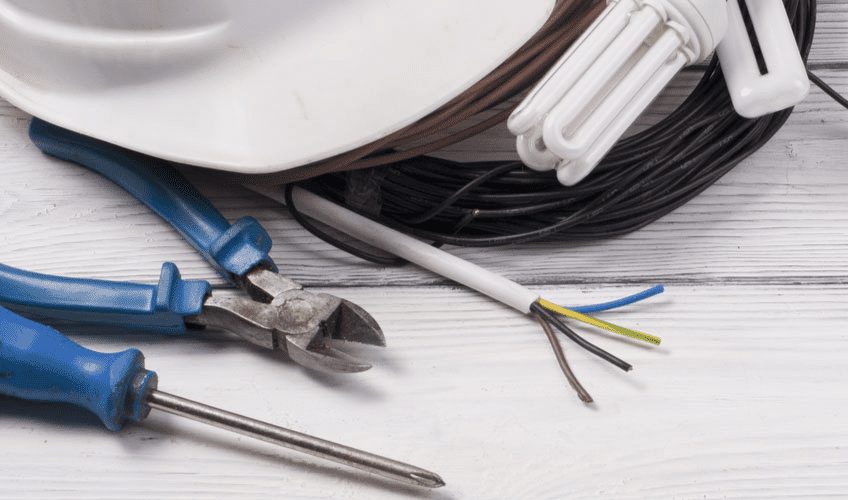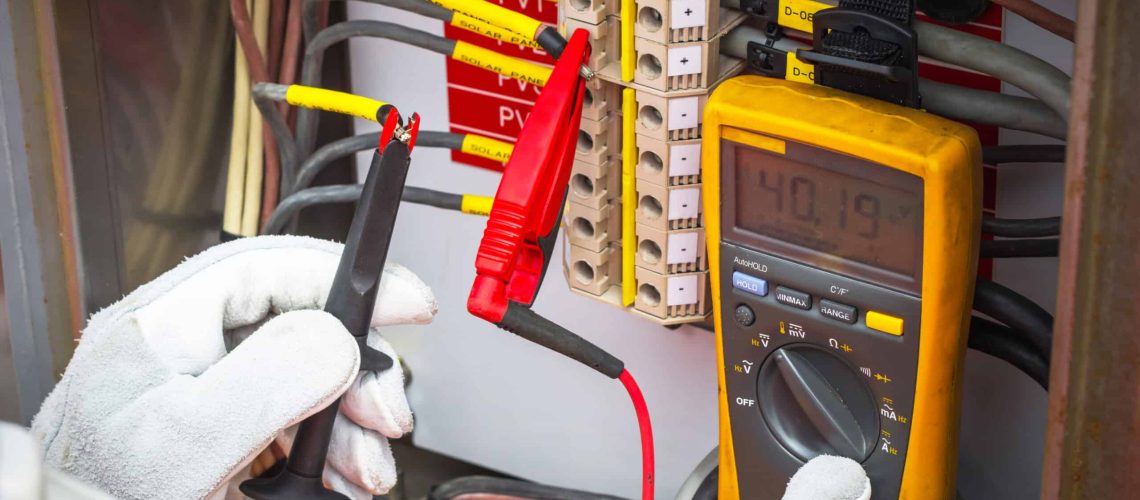

What Is The Cost To Rewire A House?
- ,
- , House Rewires, Wiring
The cost of a whole house rewire will depend on the size of the house, layout of the property, size of the rooms and the length of time since the last rewire took place. On average, cost to rewire a house can range from £1,500 to £15,000.
how much does it cost to rewire a house?
The below tables will offer you a guide to the estimated cost of a full house rewire dependent on the size of the property or that of rewiring singular particular rooms.
Please be aware that if the property is that of an older house or has been titled as a listed property, the cost of the rewire may be higher because of certain building regulations.
The following table comprises estimates of a full rewire for a house, bungalow and flat or the rewiring of specific rooms, i.e. the kitchen, bathroom or garage.
Property Size | Average Cost (+ VAT) |
Flat: | |
1 Bedroom Flat Rewire Cost | £3,500 – £4,500 |
2 Bedroom Flat Rewire Cost | £4,000 – £5,000 |
3 Bedroom Flat Rewire Cost | £4,000 – £5,000 |
House: | |
2 Bedroom House Rewire Cost | £1,500 – £3,000 |
3 Bedroom House Rewire Cost | £3,000 – £5,000 |
4 Bedroom House Rewire Cost | £5,000 – £7,000 |
5 Bedroom House Rewire Cost | £7,000 – £9,000 |
6 Bedroom House Rewire Cost | £9,000 – £15,000 |
Bungalow: | |
2 Bedroom Bungalow Rewire Cost | £1,250 – £3,000 |
3 Bedroom Bungalow Rewire Cost | £2,750 – £5,000 |
4 Bedroom Bungalow Rewire Cost | £4,700 – £7,000 |
5 Bedroom Bungalow Rewire Cost | £6,750 – £9,000 |
6 Bedroom Bungalow Rewire Cost | £8,700 – £14,000 |
How Long Does It Take To Rewire A house?
Rewiring a house typically takes 3 to 12 days. This timeframe accounts for the complexity of accessing and replacing the electrical wiring that extends to all areas of the home, ensuring each room has reliable power.
The below table will offer an estimate of the duration of a house rewire dependent on the property.
Property Size | Duration* |
Flat: | |
1 Bedroom Flat | 3 days |
2 Bedroom Flat | 4 days |
3 Bedroom Flat | 7 days |
House: | |
2 Bedroom House | 4 days |
3 Bedroom House | 7 days |
4 Bedroom House | 10 days |
5 Bedroom House | 14 days |
6 Bedroom House | 20 days |
Bungalow: | |
2 Bedroom Bungalow | 4 days |
3 Bedroom Bungalow | 7 days |
4 Bedroom Bungalow | 10 days |
5 Bedroom Bungalow | 14 days |
6 Bedroom Bungalow | 20 days |
**Please note that the stated duration of the electrical rewiring costs are estimated.
Helpful Article: What Are Electricians Hourly Rates In The UK
What Is An Electrical Rewire?
An electrical rewire is the upgrading of the consumer unit and the replacement of old wiring.
Due to the electrical wiring system powering various appliances throughout your home, it is important that the electrical and wiring system is reviewed every 20-25 years to ensure the safety of said wiring system and to meet the necessary regulations.
Upon buying a new home, it is recommended that a review is carried out by your chosen electrician or paperwork from the owners are presented of when the last rewire took place and what was completed so you can retain these in the instance it is needed.
For the duration of the full house rewire, the registered electrician will complete the following, once gaining your views and consent:
1. Appoint new cabling.
2. Mount modern back boxes on any switches and sockets.
3. Rewire all TV aerial sockets and telephone sockets.
4. Remove/add switches, sockets or light fixtures at your discretion.
What are the benefits of rewiring?
It is a huge benefit to rewire your house to ensure the safety of the property, plug sockets and the use of appliances within, in turn ensuring the safety of you and your family.
Like most things, electrical wiring will wear and tear over the years, which could result in appliance faults alongside the more dangerous aspect that an electrical overload could occur. If weakened wire is left for too long, damage to amenities is likely which could cost thousands to frequently repair or replace.
Other benefits include:
A Compliant Property
Homeowners and Landlords have a requirement to keep the property they own harmonised with that of the most up to date building regulations specifications – even more so the latter due to the duty of care they have to their tenants.
Recently published was the British Standard 7671, which outlines the standards regarding electrical wiring. Although there is no legal requirement to comply with the British Standard 7671, many other legislative pieces, compromising of the Electricity, Safety, Quality & Continuity Regulations 2002, denote that the BS 7671 is the benchmark to be achieved.

Increases Your Properties Value
If you’re looking to sell your property, having a recently completed house rewire can add thousands on to the value of your property if signed off by an inspector. As a result of a recent rewire, it could possibly attract more potential buyers than what a house would that needed a rewire because it’s one less expense for them to worry about.
Decreases the possibility of power loss.
The most common reason behind an electrical surge/power loss is due to deteriorated electrical wiring. If the wiring within the property is faulty, it can cause problems with powering electrical appliances due to the system being unable to create enough power or, on the other hand, the property could overload with electricity and shut down.
Given the inconvenience a lack of electricity to the property would cause, it is probably because the property needs a rewire if they are getting more frequent.
Save Money!
Yes, hear me out, I know you are thinking how spending £10,000 upfront saves me money. Well, as a result of defective wiring can increase your electricity bill without you even realising! Damaged wiring tends to ‘ooze’ electricity, resulting in more power being used when electrical appliances are in use, potentially doubling the standard cost of your usage if the wiring was in excellent condition.
What Are The Common Signs Your House Needs Rewiring?
There are a few things to bear in mind when it comes to your property and diagnosing the solution. In the case of a potential house rewire, the following are things you should consider.
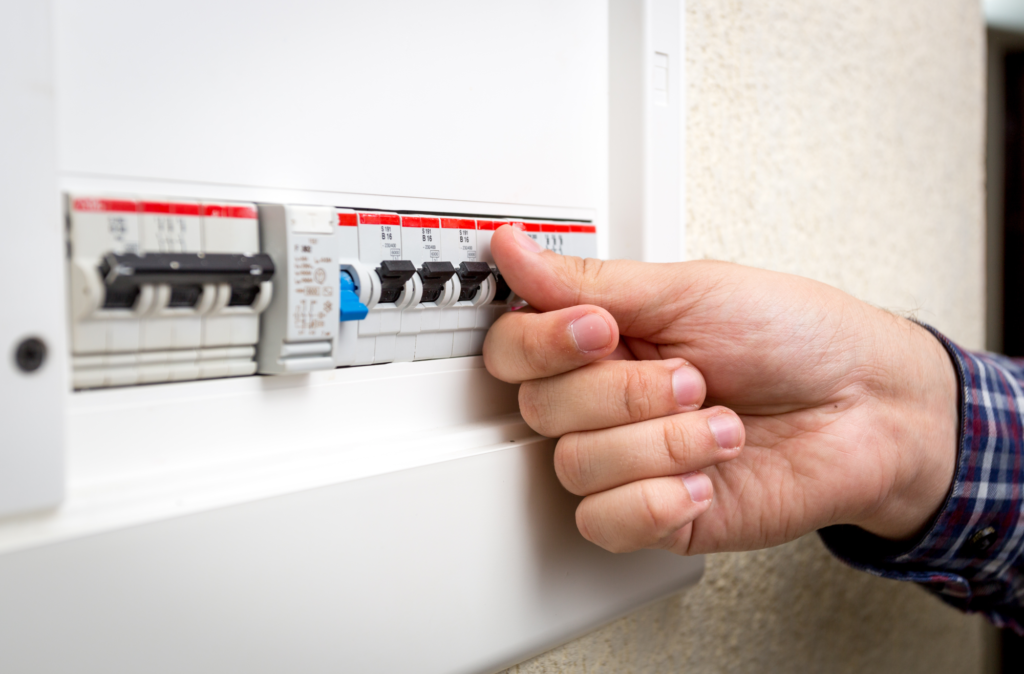
Electric keeps tripping out regularly
If electrical appliances are constantly dimming or flickering within multiple rooms in the property, it could be an indication that the wiring needs to be checked by an electrician. Although, please note, if a single light is flickering/dimming, then it may just be a problem with the bulb – if this is changed and continues to be problematic, it’s best to have an electrician come take a look.
Cracking or buzzing noise around your electrical components
This is a potential fire hazard and would need to be assessed by an electrician as a matter of urgency. If electricity attempts to jump from one connection to another through unsafe wiring (also known as Arcing), this can create a spark that could result in a fire.
Outdated consumer unit and fittings
If your fuse box looks old or the sockets and switches look worn/are not secure to the wall and wiring is exposed, this is a definite indication that the property could need a rewire. Loose sockets and switches will constantly leak electricity, which is a fire hazard – add to the mix any pets or children in the home, and it could lead to a more severe outcome.
Discolouration or scorching of wiring or fittings
Discolouration (brown markings) on any electrical sockets is a plausible sign that the circuits behind are not working efficiently. Small fires within the sockets are caused by lax connections internally in the socket itself and is of course extremely dangerous and can lead to larger fires if left.
Your house has not been rewired within 25 years
If your property has not been rewired during a 25-year period, it could mean that the electrical systems and wirings are ‘out of date’ and may need to be enhanced to meet regulations.
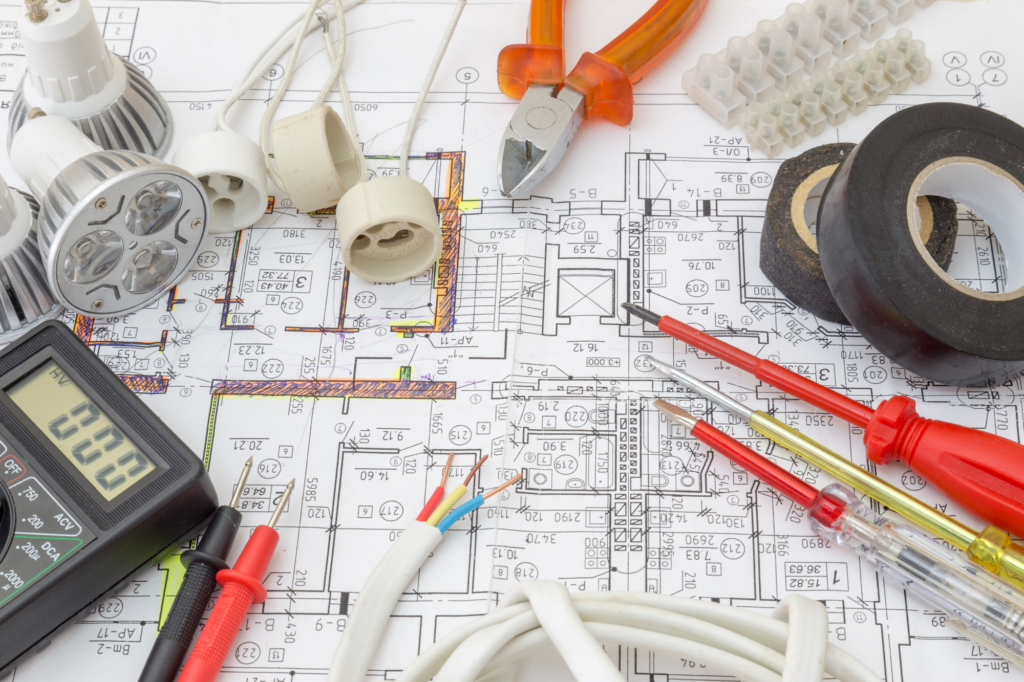
What Does Rewiring A House Involve?
A house rewire is a full removal of old wiring within the walls, floors and ceilings, sockets and switches of a property and replacing them all with new cables and wiring.
Related Article: UK Old Wiring Colours Explained
Choosing An Electrician & Getting Quotes
Take your time when choosing an electrician for a house rewire this large and ensure you check they are suited and able to complete the job. Checking this can be done through qualifications, insurance and past working reviews for the same job.
Existing Wiring Inspection
An existing house rewire is valid for 20-25 years from the point the rewire was complete. However, just because you are within this timeframe doesn’t necessarily mean that things can’t go wrong. Regular checks should be undertaken every 10 years to ensure the electrics are in good condition.
Fitting Your New Wiring & Components
To complete a house rewiring is probably one of the largest and most disruptive home improvements that could be undertaken. Some walls may need to come down or be drilled into, and the flooring lifted to access the wiring behind and sockets lifted from the walls.
The new electrical system will be connected by installing the switches, lights, sockets and the new consumer unit – the upgrade of a fuse box.
Post-Installation Tests
The electrician completing the full house rewire is legally obligated to perform a circuit test to inspect the new installation and provide you with a certificate as evidence that the work undertaken is fully functional and meets the compulsory regulations.
What does the ‘rewiring a house’ cost include?
The average cost of a house rewire depends on the size of the house and when the last time a rewire took place – the average costs can be found below.
Different electricians will have different packages, but most will complete the work as necessary, plaster the walls where holes have been made, remove the waste, and somewhat of a clean-up.
However, as stated before, electricians will offer different packages – however, it is recommended to gather multiple quotes from different electricians and their packages and make an informed decision.
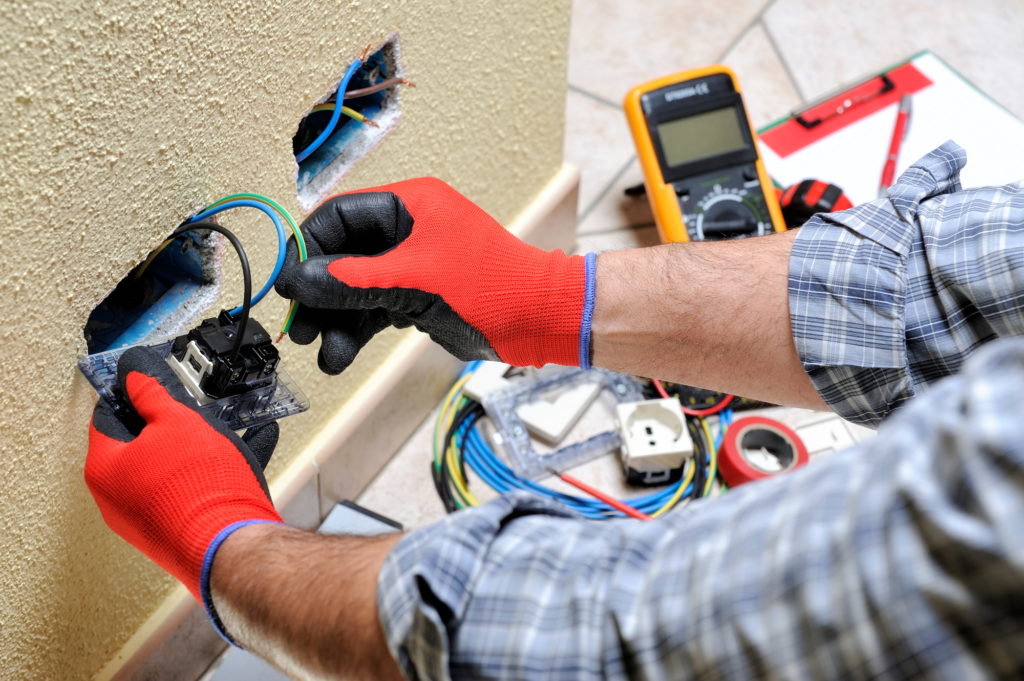
Is it worth rewiring a house?
Definitely, if you are looking to remain in your property for a long time to come, a house rewire is essential to maintain the property’s electrical elements, ensuring your safety – or at least minimising the risk of potential electrical issues or fires.
On the other hand, if you are looking to sell your property, as noted previously, a house rewire can attract potential buyers due to the peace of mind that it has been recently completed and may add value to the property too.
Is rewiring a house covered by insurance?
There is potential that your home insurance will cover your house rewire. However, it would depend on the package you purchased. Although insurance companies acknowledge electrical rewiring is essential maintenance, it is unlikely that a house rewire will be covered in any insurance policy.
In the instance a fire occurred due to an electrical fault, insurance companies may pay out to cover the damages/loss of items, but not for anything else.
Is it worth adding CCTV when getting my house rewired?
There are many benefits when looking to install CCTV cameras on/in either a private or commercial property.
Dependent on the number of cameras installed, CCTV costs and installation costs the benefit of having CCTV installed outweighs this!
Although the original camera cost/home CCTV installation cost may seem high, the security provided for many years, the quality of the footage captured and recording equipment is only a pro, as in instances of intruders/issues within the property, you will have visual evidence that could support any police investigation or claims.
What Are The Labour Costs For Rewiring a house?
The labour costs for rewiring a house can vary depending upon your location, the size of the property and how many rooms are looking to be rewired.
Electrician Labour Costs & Timescale
The table above shows the estimated costs is that of an electrician and not any additional extras such as fitting carpets, plastering walls and replacement of floorboards.
The average daily rate of an electrician is £310.
Carpet Fitter Labour Costs & Timescale
If you decide to have your carpet in your property replaced after the rewiring has been completed, the average daily rate of a carpet fitter is £250.
Carpet Fitter Labour Costs & Timescale
If any additional tasks need to be completed upon completion of the house rewire, the average daily rate of a labourer is £180.

What Affects the Cost of Rewiring a House?
There are many elements that affect the cost of house rewires, some of which could save you money!
House Size
The general rule of thumb is the bigger the house; the more money will need to be spent. If the whole house needs re-wiring and you have a 4, 5 or 6 bedroom house, the job could potentially involve more workmen and additional equipment to complete the job professionally and safely in comparison to that of a 2 or 3 bedroom house.
Empty or Occupied
Given the extent of the work that will take place – the removal of carpets, chiselling walls, lifting of floorboards etc. – it is recommended for the property to remain vacant throughout the rewiring period, meaning some larger items may need to be placed into storage and refuge will need to be sought elsewhere.
On the other hand, if the thought is to remain in the house to save on those storage and refuge costs, this could still be as costly, if not more so, due to the electricians having to ensure the property is safe and tidy upon your arrival at the property each day.
Ultimately, this would add extra days to the overall project due to the necessary checks that need to be completed daily by the electricians and the placing back of carpet/furniture.
Number of Fittings
Of course, with most things, the more you purchase, the more it’ll cost! Depending on the number of fixtures that need to be replaced will either decrease or increase your final bill.
Number of Fittings
The cost of disposing of waste during a full house rewire should be within the package that the electricians provide you with – make sure you check what is and isn’t included!
Some electricians may not have the transport or relevant waste licence to dispose of the equipment leftover therefore, the cost of this would fall to you, which varies depending on the amount of waste looking to be disposed of and your location.
Do You Need Planning Permission To Rewire A House?
Usually, a full house rewire does not require planning permission. However, if the property you are looking to have rewired is noted as a listed building, it is essential that your local planning authority is contacted with your intentions to ensure that the work can go ahead.
Before I Hire An Electrician, Should I Get A Electrical Installation Condition Report (EICR)
You will not need an EICR before the house rewire has taken place – upon successful completion of the project, your electrician will provide you with an EICR, which remains in place for 5 years.
Need to find out more information about EICR Certificates wherther its requirements or duration? View our all in guide here
How much does an Electrical Installation Condition Report (EICR) cost?
The cost of an EICR varies dependent on the size of the property. Estimates are as below:
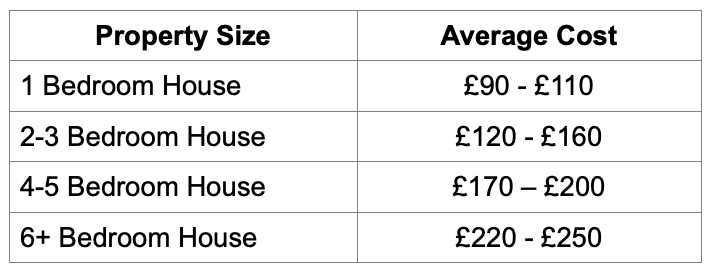

How Do I Find and Hire a Qualified Electrician To Rewire A House?
The quickest way to gather multiple quotes from local electricians to complete your full house rewire would be to visit Google and find qualified electricians in your area. Sites like Checkatrade will also provide the backgrounds of all electricians within your local area, review their work, and provide an overview of qualifications and work experience.
Qualifications
There are numerous qualifications, past and present, an electrician should possess, which are as follows:
* Please note there are many different qualifications an electrician could hold
Level | Awarding Body | Qualification Title |
1 | EAL | Access to Building Services Engineering |
1 | C&G 2000 Certificate 2000-12 | Access to Building Services Certificate in Introduction To Electrical Installation Skills |
2 | C&G 2365 | Electro-technical Craft |
2 | C&G 2365 | NVQ in Electro-technical Services & Systems |
2 | C&G 8202 | Technicals in Building Services Engineering |
3 | C&G 2365 | Electro-technical Craft |
3 | EAL | Electrical Installation |
3 | C&G 2357 | Electro-technical Qualification |
3 | C&G 2397 | Installing, Testing & Ensuring Compliance of Electrical Installation Work in Dwellings |
3 | C&G 2356 | Electro-technical Services & Systems |
3 | EAL | NVQ Diploma in Electro-technical Services |
3 | EAL | Requirements for Electrical Installation BS 7671: June 2008 (2015) |
3 | C&G 2919 | Electrical Vehicle Charging |
3 | C&G 2382 | Requires for Electrical Installations |
3 | C&G 5357 | Electro-technical Technology |
Registered & Certified
As noted previously, there are many qualifications an electrician could hold to become registered and certified however, it is noted that a qualified electrician needs to have a minimum of 3-4 years of experience as an apprenticeship alongside obtaining a Level 3 Technical and Vocational qualification.
Of course, the more qualifications held, the more business the electrician would receive due to knowledge and experience.
Insurance
Liability insurance would be needed to develop an electrician’s business and for those who are self-employed.
This insurance would cover the electrician against injuries or damage to the property which may have been caused whilst the work was being carried out.
Suitable Experience
An electrician should hold a minimum of 3-4 years of experience as an apprenticeship alongside the relevant degrees in order to be qualified.
Of course, most individuals would search for most professionals and obtain this information through word of mouth from friends or relatives or utilise the Checkatrade platform.
It is proven that the more experience and completed, satisfactory work, the more business a professional would receive.
Frequently Asked Questions On Rewiring A House
Here we will touch upon the most common question asked in relation to the cost to rewire a house.
How Can I Save Money on Rewiring My Home?
A few methods can save you money if your home is due to be rewired. Adhoc tasks that can be completed by you – such as lifting the flooring, purchasing and laying down dust sheets and the clean up after the house rewire has taken place – can save you money and time in the long run.
If these aspects are not completed by you and are part of the electrician’s package, it would be an additional and unnecessary cost.
Combine Rewiring With Other Electrical Jobs
Combining other electrical jobs that need to be completed with your full house rewire can save you money, such as installing new plug sockets or additional lighting installations. Obviously, it’s only a saving if these aspects are needed and not wanted.
Aspects such as purchasing your own electrical equipment – new sockets, new light fittings etc. – will help reduce the end bill that the electrician would provide you.
Most retailers may offer discounts on bulk purchases, and many will have sales throughout the year to help you stock up on the needed items.
It is recommended that the purchasing of wirings, wire clips, consumer units and conduits are left with your electrician due to their vast knowledge of this type of equipment.
Leaving the Property
It is recommended that all individuals are to leave the house whilst a full rewire is taking place. Not only is this convenient for all parties, but it will also save you money too!
If you were to remain in the property, additional tasks would need to be completed daily to ensure the property is habitable – the checking of the electrics, the clean-up etc, incurring additional costs.
Leaving the property vacant will reduce the tasks the electricians need to complete resulting in a quicker and cost-friendly finish.
How Often Do I Need to Rewire My House?
Although a house rewire can last anywhere between 20 – 40 years, it is recommended that the wiring is checked by an electrician every 25 years unless a fault as occurred before this time period.
What Are the Regulations on Electrical Wiring In the Home?
Currently, the national standard used for electrical installations within the UK is the BS 7671, which has been in place since 1st January 2019.

Do I need to rewire my house to sell it?
No, you do not need to rewire your house if you are looking to sell it.
Does a 1950s house need rewiring?
All houses at some point will be in need of a full house rewire; it is all dependent on the last time the electrics within the house had been inspected and when the last full house rewires took place.
If there are any signs that are worrying you when it comes to your electrics within your home, please contact an electrician to inspect and review the property.
Can I Rewire a House Myself?
It is recommended that you do not rewire your own house unless you are a qualified electrician. However, it is not illegal to do so – as long as an electrician will review your work as you go, something most will not do.
Can my house be rewired while I am still occupying it?
It is desirable that the property is vacant whilst the rewiring takes place. To work safely, all power will need to remain off alongside furniture being removed for the electricians to be able to work. It is preferred that the house remains vacant throughout the project. However, some electricians may allow the house to be occupied, but this would mean more work for them – ensuring the electrics are continuously checked and tested daily and that waste/rubbish is removed. If you wish to return to the house, this could add more to your final bill than first anticipated.
How disruptive is rewiring a house?
Given the large scale of a house rewire, it is going to be a disruptive project. Due to entry being needed into certain walls, ceilings and floorboards, all electricity and water would need to remain off during the time period of the project.
Can you rewire a house without removing plaster?
To rewire a house, it is necessary for certain areas within walls, floors and ceilings to potentially be removed, depending on the location of electrical sockets and switches.
Is it best to inform my neighbours of my plans? Does the law require it?
Although it is not a legal requirement to notify your neighbours if you are having renovations completed to your property between specific hours, it would be considerate of you to let them know as a house rewire can be noisy work.
How will I know I need my property rewired without spending a lot of money?
There are a number of things that could occur that will make it apparent your house is due a rewire, which include:
Your house has not been rewired within 25 years.
Discolouration or scorching of wiring and/or fittings.
A cracking or buzzing noise around electrical components.
Outdated consumer units and their fittings.
Electrics are regularly tripping.
My house has been flooded. Do I need to rewire it?
Depending on where the water damage is located the amount of water released can mean that a partial electrical rewire is needed. It would be unlikely that a full house rewire would be needed due to a flood; however, a certified electrician or an emergency electrician in this circumstance would be able to advise you correctly once they have assessed the situation in person.
If electrics have been damaged by a minor water flood, the most likely approach would be for an electrician to dry out the cables and replace any items – sockets, plugs, switches – that are no longer safe.
Given that this instance is fairly unique to each house due to the electrical layout, it is recommended that an electrician be sought to fully assess the situation. From there, they will be able to update you and recommend the work that needs to be undertaken.



